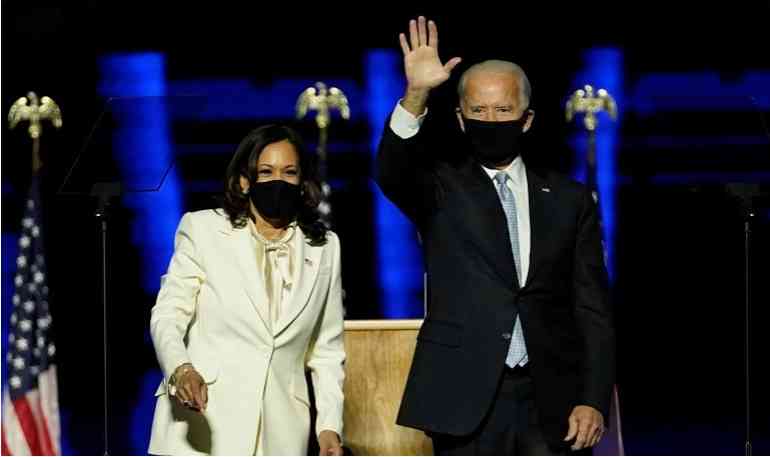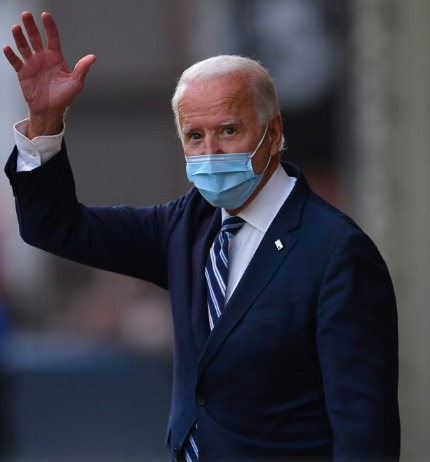Biden Presented to the American People as the antithesis to Combative Trumpism – and emerged the victor

Key Highlights
- Biden Presented to the American People as the antithesis to Combative
Trumpism – and emerged the victor
- Joe Biden ran a relaxed and sturdy campaign in glaring contrast to
the Trump
- Joe Biden had characterized his campaign for the White House as a
“battle for the soul of the nation” against Donald Trump, a president
he said threatened the very foundation of American democracy.
- He was not a rising star, a barrier breaker, or an anti-establishment outsider. Nor was he pledging to shake up Washington or
lead a political revolution. But Biden knew why he was running.
- Biden offered America a timeout, a cooling-off period to reset
after four dizzying years of bare-knuckled Trumpism.
The 2020 United States
presidential elections were the 59th quadrennial presidential
election which was held on Tuesday, November 3rd, 2020. The
Democratic ticket of former vice president Joe Biden and U.S senator from
California Kamala Harris defeated the Republican ticket of incumbent President
Donald Trump and vice president Mike Pence. This was the first elections since
1992 in which an incumbent president failed to win re-election to a second term.
Biden received more than 75 million votes, the most votes ever cast for a
presidential candidate in American elections, beating Barack Obama's record of
69.5 million votes from 2008 as well as Donald Trump in 2016.
Joe Biden had
characterized his campaign for the White House as a “battle for the soul of the the nation” against Donald Trump, a president he said threatened the very foundation of
American democracy.
Now, four years after
Americans elected a real estate developer-turned reality TV star with no
political experience, they have elected a former US senator and vice-president
with nearly 50 years of political experience.
Democrats agonized and strategized over how to beat a candidate as unconventional and unpredictable as Trump. The answer, Biden showed, was a completely conventional and predictable campaign.
|
Democrat Presidential Candidate waves to his supporters at a campaign rally in Atlanta, Georgia (Photo Courtesy)
The central issue of
the election included the public health and economic impact of the ongoing
covid-19 pandemic that has killed more than 227,000 Americans, economic
turmoil, civil unrest in reaction to the police killing of George Floyd and
others, the death of supreme court justice, a briefly hospitalized president –
the race remained remarkably stable towards the end, and polling correctly
predicted a Biden victory, though by a narrower margin than anticipated.
He was not a rising
star, a barrier breaker, or an anti-establishment outsider. Nor was he pledging
to shake up Washington or lead a political revolution. But Biden knew why he
was running.
“Look, I am running
because Trump is the president and I think our democracy is at stake, for
real,” Biden told reporters in July. “And what seems to be the case is many
Americans – those who don’t like me and those who do – view me as the
antithesis of Trump and I believe that I am.”
Despite Biden securing
the Democratic nomination over his closest rival, Senator Bernie Sanders in a
competitive primary that featured the largest field of presidential candidates
for any political party in the modern era of American politics.
Biden maintained a
relatively low profile, a slow and steady approach meant to demonstrate that he
was a serious, sober leader who listened to the “docs” and followed the
science. He operated a mostly digital campaign before eventually returning to
the physical trail.
The election saw a
record number of ballots cast early and by mail, due to many states relaxing
restrictions on mail-in voting in response to the COVID-19 pandemic. As a
result of a large number of mail-in ballots, some swing states saw delays in
counting and reporting, leading to major news outlets not projecting a winner
as earlier anticipated. Careful not to repeat the mistakes of 2016, Biden lavished
attention on the trio of rust belt states that swung for Trump in 2016:
Pennsylvania, Wisconsin, and Michigan. But he also seized opportunities to
expand the electoral landscape, winning a remarkable upset in the
Republican bastion of Arizona.
But even as Democratic
enthusiasm propelled a wave of early voting and his opponent barnstormed the
swing states with big rallies that flouted public health guidelines, Biden
stayed the course. He continued to hold small events with few guests and a
contingent of reporters.
Trump relentlessly
mocked this strategy, accusing Biden of dwelling in his basement after waving
“a white flag on life”. Asked about the remark, Biden called his opponent
“pathetic”.
Many Democrats feared
that a lack of enthusiasm would imperil Biden’s candidacy. According to an
October Pew poll, 63% of Biden supporters said their choice was more a vote
against Trump than for Biden. In contrast, 71% of Trump supporters said they
were voting for the president.
But his supporters were
already motivated. Pent-up anger that was built throughout Trump’s presidency –
from the Women’s March to the #MeToo movement and the nationwide Black Lives
Matter protests – crested on election night. A coalition of young people,
voters of color, and white suburban women aligned to seal Trump’s fate.
Biden courted
Republicans and moderates and won the support of the Ohio governor and former
presidential candidate John Kasich, former Arizona senator Jeff Flake and Cindy
McCain, the widow of the Arizona senator John McCain. He assailed Trump for
governing only for his base of loyalists and to be “an American president”.
Biden offered America a
timeout, a cooling-off period to reset after four dizzying years of
bare-knuckled Trumpism.
That was Barack Obama’s
pitch when he returned to the campaign trail last month on behalf of his former
vice-president. Obama imagined a future when voters didn’t have to think about
the president’s latest tweet or insult. They wouldn’t have to think about the
president at all.
“With Joe and Kamala at the helm, you’re not going to have to think about the crazy things they said every day,” Obama said. “And that’s worth a lot.”
